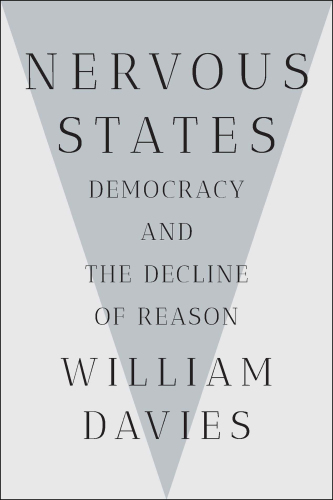
Nervous States
Democracy and the Decline of Reason
کتاب های مرتبط
- اطلاعات
- نقد و بررسی
- دیدگاه کاربران
نقد و بررسی

December 1, 2018
A cogent argument for why scientific and political debates must account for feelings of victimhood, fear, and betrayal.Clashes between "cold objectivity" and "emotive falsehood," between knowledge-based fact and visceral feeling, pervade contemporary discourse. Davies (Politics and International Relations/Goldsmiths, Univ. of London; The Happiness Industry: How the Government and Big Business Sold Us Well-Being, 2015, etc.) offers a penetrating analysis of 21st-century politics and culture in the U.S. and the U.K. Tracing the history of ideas beginning in the Enlightenment, the author transcends the familiar dichotomy of educated/uneducated, urban/rural, cosmopolitan/tribal that has come to explain combative political debate and elections that resulted in Brexit and Donald Trump's presidency. Davies sees a deepening crisis of trust in science, political representatives, and the professional media, whose practitioners are attacked as "elites" who favor the perspectives of "their own cultural and educational background." Because the "civil and gentlemanly dimension of expert knowledge never includes everyone as a participant," expertise has become associated with oppression and exploitation. Libertarians, among others, criticize scientific consensus--about climate change and vaccines, for example--as a "monopoly" and threat to free thought; instead, they promote the market as a valid discriminator between truth and lies: "Reality is all in the eye of the investor, creditor, or shopper." Along with distrust of experts, Davies notes an erosion of the dichotomy between mind and body, rational thinking and emotive feeling, validated by discoveries in neuroscience and psychology. Feelings of pain, loss, and defeat have spurred the rise of populists, as well as conspiracy theorists, among those who feel disenfranchised and marginalized. Digital networks, rather than supporting "scientific ideals of factual consensus or objectivity," instead delude users with the belief that the world "will become more obedient" to them. The author sees no prospect that defenders of science and rationality will regain widespread trust as "heroic scientific truth-seekers," but they can contribute to fulfilling "simple, realistic, and life-changing promises" and creating "new institutions of social contracts and peace."A fresh, astute examination of current events and urgent challenges.
COPYRIGHT(2018) Kirkus Reviews, ALL RIGHTS RESERVED.

February 1, 2019
From Americans increasingly experiencing chronic physical pain that impacts their daily life since the mid-20th century to the start of nationalism with the political left during the French Revolution, Davies (political economist, Goldsmiths, Univ. of London;$SPACE$The Limits of Neoliberalism) explores these and other seemingly disparate possible causes of how Western populations came to their current political environment and disregard for scientific study on polarizing issues. Not solely considering external factors, Davies takes an introspective look at why politicians are increasingly listened to instead of experts for presentation and analysis of issues, and if movements such as the March for Science help or hinder this and how trends can be changed. This is all tied in to early research on crowd mentality, Hobbesian thought, PTSD, and economic hardship to determine what may have caused the rifts and unsettledness across populations today and how to move past it. VERDICT Academic, though accessible and of interest to all readers given the range of topics.--Zebulin Evelhoch, NC LIVE, Raleigh
Copyright 2019 Library Journal, LLC Used with permission.

























دیدگاه کاربران